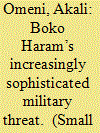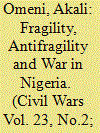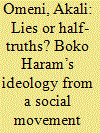| Srl | Item |
| 1 |
ID:
164148


|
|
|
|
|
| Summary/Abstract |
This paper evaluates Boko Haram’s military capabilities and details the process of how its standing army, driven by these capabilities, came to pose a phased threat between 2013 and 2015 in particular. This was a period when military fighting dominated the insurgency in north-east Nigeria. Whereas there is an abundance of literature on Boko Haram’s histories and the impact of its insurgency on north-east Nigeria, analysis of Boko Haram’s military campaigning is still deficient. Attempting to fill this gap, this paper uses field findings and battlefield case studies from north-east Nigeria to highlight how Boko Haram’s overt front – its standing army – came to supplant its guerrilla operations as the main security threat to the frontier area.
|
|
|
|
|
|
|
|
|
|
|
|
|
|
|
|
| 2 |
ID:
181095


|
|
|
|
|
| Summary/Abstract |
Focusing on Biafra’s calculus of war to shed new light on the rebel-side debate, this article revisits the Civil War of Nigeria (1967–1970) to extract campaign lessons for the Nigerian Army (NA) in its fight against Boko Haram (BH). The paper uses Nassim Taleb’s ‘antifragility’ theory to explain why Biafra rebels crumbled under traditional military campaign stressors imposed on them. By contrast, Boko Haram’s ‘antifragile’ threat has grown, even as campaign stressors imposed by the NA increased. Embracing the differences in operational environment within both conflicts, this article reflects on the implications of BH’s antifragility for the NA’s counter-insurgency (COIN).
|
|
|
|
|
|
|
|
|
|
|
|
|
|
|
|
| 3 |
ID:
185519


|
|
|
|
|
| Summary/Abstract |
Using Social Movement Theory (SMT) as a methodological framework and explicitly employing the core SMT concepts of political opportunism and framing, this paper seeks to examine Boko Haram's use of discourse in activism. As a rarely employed research method within the Boko Haram literature, SMT holds explanatory power around the movement's approach to transforming motivation potential into actual mobilisation via frame resonance. Focusing on the application of framing within (interpreted) sermons, lectures and exhortations by both Muhammad Yusuf and Abubakar Shekau as former substantive leaders of Boko Haram, this paper unpacks the discourse of Boko Haram's ideology. The paper shows that this ideology, which contrasts the softened core of the Salafist/Wahhabi doctrines from which Boko Haram broke away, relies on problematic interpretations of Qur’ānic exegesis and political thought as both relate to faith and governance in northern Nigeria. One policy recommendation to emerge from this study is that counter-narratives to Boko Haram's ideology should highlight not just why but also how the group's rhetoric employs lies and half-truths in an attempt to rationalise its activism; despite what appears to be an adherence to Qur’ānic exegesis, in making its claims.
|
|
|
|
|
|
|
|
|
|
|
|
|
|
|
|